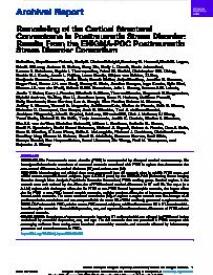Remodeling of the Cortical Structural Connectome in Posttraumatic Stress Disorder : Results From the ENIGMA-PGC Posttraumatic Stress Disorder Consortium
Background
Posttraumatic stress disorder (PTSD) is accompanied by disrupted cortical neuroanatomy. We investigated alteration in covariance of structural networks associated with PTSD in regions that demonstrate the case-control differences in cortical thickness (CT) and surface area (SA).
Methods
Neuroimaging and clinical data were aggregated from 29 research sites in >1300 PTSD cases and >2000 trauma-exposed control subjects (ages 6.2–85.2 years) by the ENIGMA-PGC (Enhancing Neuro Imaging Genetics through Meta Analysis–Psychiatric Genomics Consortium) PTSD working group. Cortical regions in the network were rank ordered by the effect size of PTSD-related cortical differences in CT and SA. The top-n (n = 2–148) regions with the largest effect size for PTSD > non-PTSD formed hypertrophic networks, the largest effect size for PTSD < non-PTSD formed atrophic networks, and the smallest effect size of between-group differences formed stable networks. The mean structural covariance (SC) of a given n-region network was the average of all positive pairwise correlations and was compared with the mean SC of 5000 randomly generated n-region networks.
Results
Patients with PTSD, relative to non-PTSD control subjects, exhibited lower mean SC in CT-based and SA-based atrophic networks. Comorbid depression, sex, and age modulated covariance differences of PTSD-related structural networks.
Conclusions
Covariance of structural networks based on CT and cortical SA are affected by PTSD and further modulated by comorbid depression, sex, and age. The SC networks that are perturbed in PTSD comport with converging evidence from resting-state functional connectivity networks and networks affected by inflammatory processes and stress hormones in PTSD.
Geachte bezoeker,
De informatie die u nu opvraagt, kan door psychotraumanet niet aan u worden getoond. Dit kan verschillende redenen hebben,
waarvan (bescherming van het) auteursrecht de meeste voorkomende is. Wanneer het mogelijk is om u door te verwijzen naar de bron
van deze informatie, dan ziet u hier onder een link naar die plek.
Als er geen link staat, kunt u contact opnemen met de bibliotheek,
die u verder op weg kan helpen.
Met vriendelijke groet,
Het psychotraumanet-team.
In: Biological Psychiatry: Cognitive Neuroscience and Neuroimaging ; ISSN: 2451-9022 | 7 | 9 | 935-948
https://doi.org/10.1016/j.bpsc.2022.02.008


